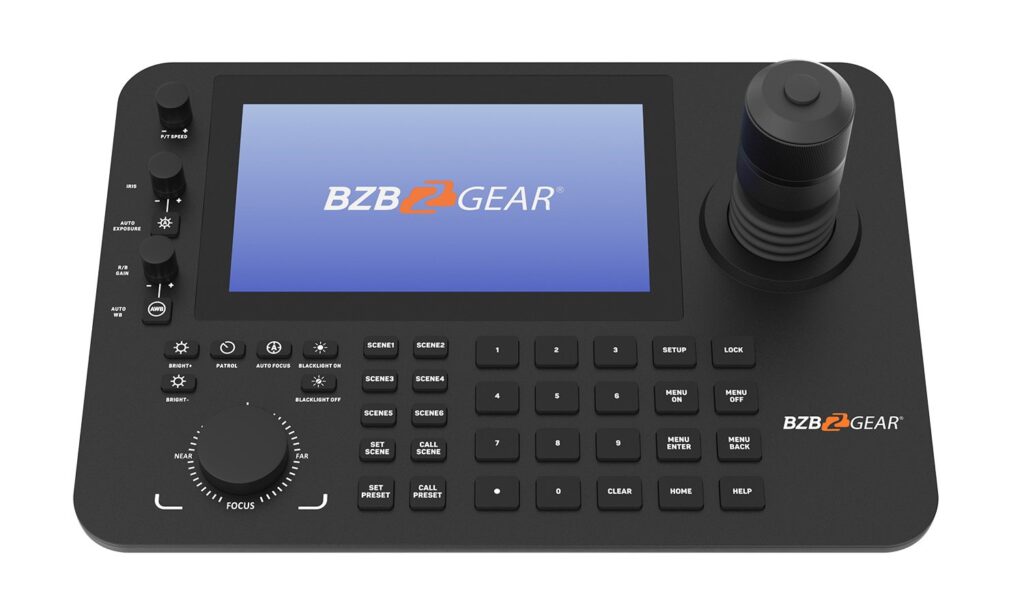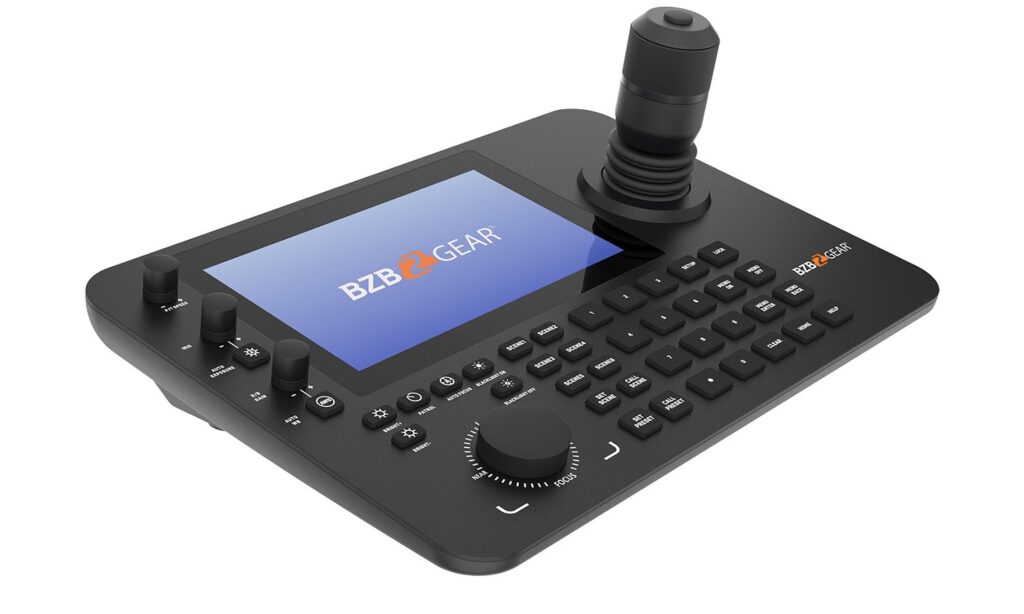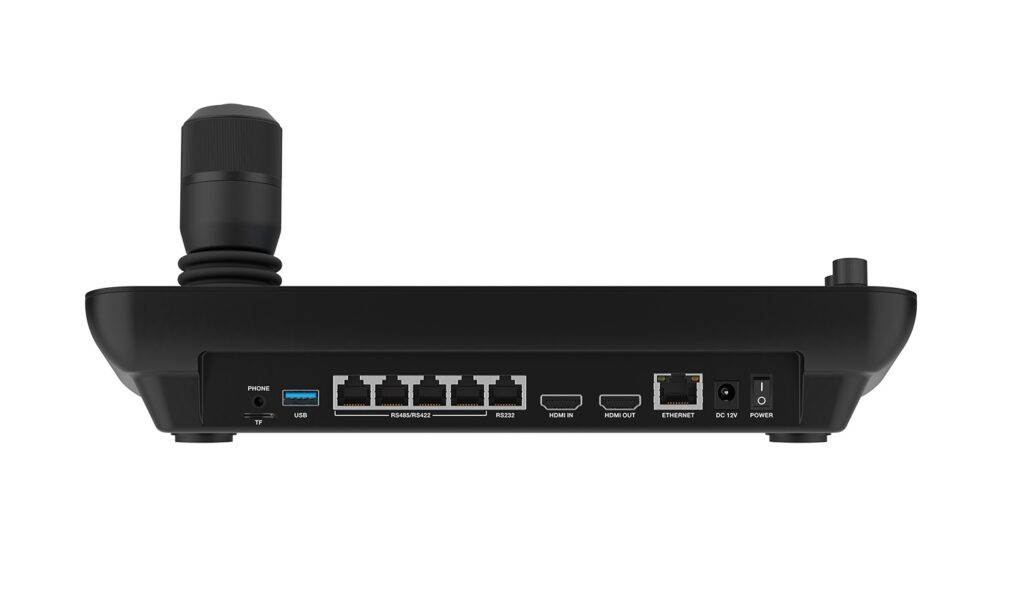BZBGear’s offering takes their PTZ universe to new heights
Original article written by Joseph Cottle for Church Production.
Build Quality
Out of the box, the Commander Pro does not disappoint. It’s weighty without being too heavy, and the matte aluminum case lends itself to the name of the unit—it feels very pro. The soft silicon buttons give great tactile feedback with a satisfying low-frequency click and the 360-degree dials to the left of the touch screen—controls for P/T speed, Iris, and R/B gain—turn with a satisfying but understated click.
The touch screen feels solid underneath your fingers, and it’s just the right size for those of us with thicker fingers, about the size of a Kindle reader. The color display is crystal clear and easy to read.
On this particular unit, at least, the joystick feels a little loose, but that does not affect camera control at all. In fact, I thought it made the cameras easier to control because I could adjust the speed of my movements before the cameras actually started to move, like a little on-ramp. The joystick control is intuitive and responsive across speed parameters for pan, and with a new firmware update, you can adjust the zoom speed.
Set Up
The Commander Pro is almost plug and play. After you’ve lived in the BZBGear’s PTZ cam world for a little bit, you’ve memorized their default IP address, 192.168.5.163. So, before you see signal on your display, you’ll need to make sure the Commander Pro’s network settings are appropriately adjusted, and then you can add cameras. We liked the Commander Pro’s camera search feature that automatically searches for all cameras on the connected network. You’ll then have to reassign each camera from the .163 address to its own address, but once that’s all set, you’ve got video—no problem.

The joystick control is intuitive and responsive across speed parameters for pan, and with a new firmware update, you can adjust the zoom speed.
BZB really nailed this process by adding a shortcut to the camera WebGUI when you select a camera on the touch screen from PTZ mode, which allows you to quickly log into each camera and adjust its IP address. Web access is also really helpful when cameras need to be rebooted for troubleshooting.
I’ll say this, however—we love our BZBGear here at LifeMission Church and ChurchProduction.com, but we initially had some trouble setting up the IP addresses. For those who are a bit more IP savvy, we learned when you connect the Commander Pro to a network switch, you can go into network settings and enable DHCP, which will allow the Commander Pro to grab an open IP address rather than doing it manually. The units are plug-and-play as far as video signal via SDI or HDMI to a switcher is concerned though.
The Focus dial is especially impressive, executing very slow focus pulls if you’re into that sort of thing.
Interface
If you’ve been using the BG-Commander-Jr, you’ll start to get excited here if you’re not already. Besides the size of the Commander-Pro, it offers an impressive upgrade form the Commander-JR with more buttons and knobs for quick controls access, a joystick that controls pan, tilt, and zoom, and, finally, a seven-inch touch screen with just about every control you’ll need for each camera as well as an integrated and customizable multi-view display. Where the Commander-JR offers pretty much only what you need to control a camera, the Commander-Pro goes above and beyond.

Besides the pleasant tactile nature of the physical interface, everything on the Commander Pro makes sense. The knobs are used to dial in your P/T speed, Iris, or R/B gain, or you can select the button below the knobs for auto settings, which function quickly without being overbearing. The Focus dial is especially impressive, executing very slow focus pulls if you’re into that sort of thing. A twin bank of buttons next to the number pad gives you quick access to the lights on each camera, auto-tracking on/off, video playback, and preset storage and recall. The number pad acts as a multi-function interface for a variety of operations like preset recall and other menu items. The last bank on the right under the joystick navigates through the Commander Pro menu.
The touch screen gives you access to all of these features as well, so you have an either / or situation, giving the user the flexibility to utilize different aspects of the controller at the same time with both the touch screen and the physical buttons. It’s all very intuitive and easy to grasp without consulting the manual.
I particularly enjoyed using these specific features:
- “Track on” and “Track off”: These two buttons to the left of the number pad allow the user to quickly switch from custom control to tracking mode without having to navigate into the WebGUI from the touch screen.
- Camera Selection: In PTZ mode, the touch screen lists the cameras on the left side of the screen and you can select each camera there or you can simply touch the camera feed itself. It’s very intuitive and user friendly.
- Enlarge: Once you have selected a camera in PTZ mode, a twin bank of buttons appear under the multiview display, offering more controls for that particular camera you have selected. One of these is “Enlarge,” which switches the touch screen from multiview to only the selected camera, giving the user a more detailed view of that feed.
Handy Cool Stuff
When you select a particular camera from the touch screen, you see a menu below the available camera feeds that offers some handy buttons:
- Photo: take a photo on that camera that gets stored on the Commander Pro’s internal storage.
- Record: Start recording to the camera’s internal storage.
- Green on/off, Red on/off: these four buttons to the left of the number pad allows the user to quickly toggle the tally light on the PTZ camera
- Patrol: this button above the focus wheel quickly sets the selected camera to patrol mode, which tells it to move through a specified path of presets.
On the back of the Commander Pro, there’s an HDMI out that takes the touchscreen display and sends it to a monitor of your choosing (another major upgrade from the Commander-JR), giving options for those who want to see a little easier. A USB port also allows for connections to a keyboard and mouse if you’d rather not use the touch screen to navigate.

Overall Impression
The BG-Commander-Pro is the real deal for any church looking to step up their PTZ game or further expand their current PTZ setup, especially those with BZBGear PTZs already installed. ChurchProduction.com can fully recommend this unit to all of our readers and subscribers, and we’ve enjoyed working with BZBGear on new releases in recent months. We’re looking forward to hearing how our community uses the BG-Commander-Pro in the future, and you can find a full rundown of it here on their website.
Joseph Cottle
Joseph is a minister and the Production Director at LifeMission Church. He’s led church production for over a decade & has a degree in Music Business and Journalism from Ferris State University. Follow him on LinkedIn, Twitter, Instagram, or Substack.
Original article written by Joseph Cottle for Church Production.
